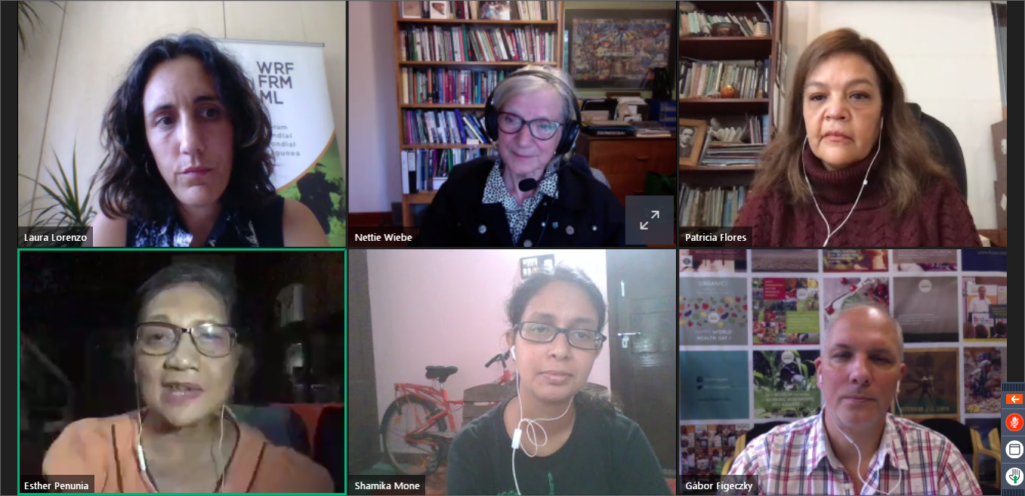“To build back better, we call on governments and development partners to recognize family farmers through their organizations and cooperatives as solution providers, as frontliners and as dynamic and active partners for the work to implement the UN Decade of family farming to accelerate the achievement of SDG 1 and SDG2. We call for direct financing to Farmers organizations at global, regional and national levels so that we can upscale our work, strengthen our role in our common pursuit for a sustainable, resilient, just, inclusive food systems.”
This was the main call presented by AFA Secretary-General Esther Penunia during a zoom meeting entitled “COVID19 pandemic: a worldwide response from the global farmers’ community. Stories from the field”, organized by the International Federation of Organic Agriculture Movement (IFOAM), held last July 14. The meeting is one of the side events of the Farmers’ Major Groups during the 2020 High Level Political Forum (HLPF), an annual meeting which is at the core of the United Nations platform for follow-up and review of the 2030 Agenda for Sustainable Development and its 17 Sustainable Development Goals.
AFA, together with representatives from various global farmers’ organizations, presented family farmers’ experiences in dealing with the COVID-19 pandemic. Zoom discussions were divided into two panels which covered overviews from both the global and regional perspectives.
Panelists for the first panel, which covered the global perspective overview, included Theo De Jager (World Farmers Organization), Shamika Mone (INOFO/IFOAM-Organics International), Nettie Wiebe (La Via Campesina), and Laura Lorenzo (World Rural Forum). Together with Ms. Penunia/AFA on the second panel were Elizabeth Nsimadala (Pan Africa Farmers Organization ), Nemo Amaral (COPROFAM), and Patricia Flores (IFOAM-Organics International).
AFA highlighted activities done by their member FOs as a response to COVID-19. Member FOs headed awareness campaigns and COVID-19 preventive activities (e.g., distribution of face masks, instruction on how to get clean water), distributed food packs to needy communities, helped sell their farmers’ produce, and partnered with government institutions to buy their farmers’ produce. AFA also shared the initiative of KGAT, an all-women cooperative from the Agta-Dumagat-Remontado indigenous community, who partnered with a national FO to sell their tribe’s produce in a farmers’ market and also distributed food packs for the urban poor.
Panelists that provided an overview from the global perspective cited instances wherein the pandemic encouraged consumers to take a second look into where their food was coming from and what produce they are buying. They also observed that there was an increase in demand for immunity boosting produce.
The panel on regional perspectives, on the other hand, shared that their family farmers had problems with the cancellation of public (e.g., schools) and private (e.g., restaurants and hotels) procurements since these establishments are the frequent buyers of their produce. They also talked about the initiatives of their farmers in helping distribute part of their produce to needy communities.
As for similarities for both perspectives, most of the panelists recalled experiences wherein their value chain was affected by the pandemic. Farmers cannot transport their produce to the cities and they lack facilities to store their products. Due to these issues, they are subjected to selling at low prices or letting their produce rot.
Farmers remedied this by doing home deliveries or by using social media to connect with consumers and sell their produce. Some of the panelists also mentioned the establishment of farmers’ markets as an avenue where they can sell their produce.
All the panelists called on their governments to recognize family farmers as solution providers and frontliners during this pandemic. Governments are encouraged to open spaces for dialogue with family farmers to understand their needs (e.g., access to farm inputs, access to transportation and storage facilities, shorter food system) so that they are able to provide fresh and healthy produce for their communities. As resilient as they are, the panelists are urging the government to address the problems faced by family farmers to further increase their potential contribution to global food security.

